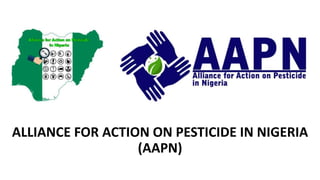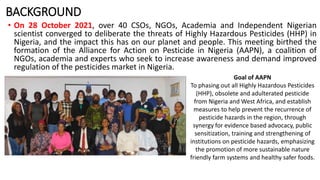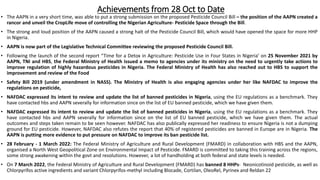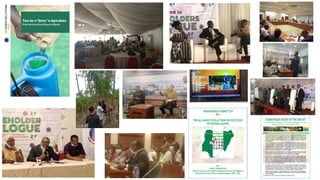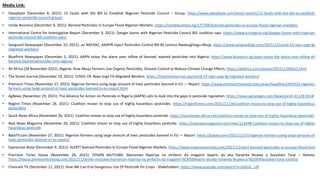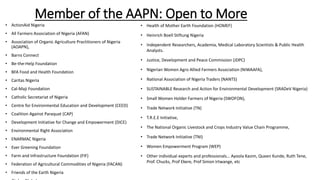ALLIANCE FOR ACTION ON PESTICIDE IN NIGERIA (AAPN)
- 1. ALLIANCE FOR ACTION ON PESTICIDE IN NIGERIA (AAPN)
- 2. BACKGROUND • On 28 October 2021, over 40 CSOs, NGOs, Academia and Independent Nigerian scientist converged to deliberate the threats of Highly Hazardous Pesticides (HHP) in Nigeria, and the impact this has on our planet and people. This meeting birthed the formation of the Alliance for Action on Pesticide in Nigeria (AAPN), a coalition of NGOs, academia and experts who seek to increase awareness and demand improved regulation of the pesticides market in Nigeria. Goal of AAPN To phasing out all Highly Hazardous Pesticides (HHP), obsolete and adulterated pesticide from Nigeria and West Africa, and establish measures to help prevent the recurrence of pesticide hazards in the region, through synergy for evidence based advocacy, public sensitization, training and strengthening of institutions on pesticide hazards, emphasizing the promotion of more sustainable nature friendly farm systems and healthy safer foods.
- 3. Working Group 1 Working Group 2 Working Group 3 Working Group 4 - What We Do and Our Working Group Science, Evidence and Research: • Investigate the Human and Environmental Costs of Pesticide Use • Gather evidences of pesticide hazard across Nigeria and Africa • Collection and development of economic models around agroecology and organic farm systems and businesses • Development of a data base on pesticide registration, import, use and promoters. • Inform academic and sector interaction on pesticide use and organic farm systems. • Tracking pesticide entry and training on data collection on pesticide hazards • The economics of the nature based alternatives – market survey, business plans and incentives for organic and agroecology • Scenario development and model building around pesticide use and alternatives. Rethinking Agricultural Practices: Detoxifying Our Food and farm practices via • Trainings and promotion of on-farm learning and skills acquisition on safe and healthy farm systems like organic agriculture, organic farming, integrated pest management practices, etc. • Promote the set-up and works of agroecology farms, organic handouts, training on sustainable healthy farms, etc. • Organise exhibitions and field tours on organic-agroecological solutions for food sustainability and biodiversity restoration. • Support policies and capacity building on organic agriculture and regenerative farm systems. • Work with governments and individuals to set-up organic and agroecological farms and afforestation programs Insufficient Laws, Regulation & Double Standards on Pesticide Block the entry channels of HHP in Nigeria and West Africa. Support global pressure to stop the export of HHP into Africa. Call for local and international investment/aids towards healthy nature friendly and responsible farm systems in Nigeria-Africa. Reduce support and dependence on HHP and conventional farm systems. Demand ERP on all Pesticide products, projects and related programs. Introduce and improve regulations and laws that govern pesticide in Nigeria and Africa. Support government in the development and implementation of phase-out frameworks for HHP in Nigeria and neighbouring. Support the development of skills on agroecology and support the upscale of organic and agroecological farms. Communication and Public Awareness: • Increase consumer and farmers awareness on hazards of HHPs in Nigeria. • Amplify the narrative of 100% safe organic farm practices like agroecology works and is sustainable • Support the showcasing and exhibition of organic solution and agroecology • Debunk the safety myth of HHP in cases where local realities cannot guarantee the affordability of safety on HHP from farmers. • Simplify complex messages, policies, research and model on pesticide hazards and the nature based alternatives. • Bring to public knowledge the experiences of victims of pesticide hazards. • Led investigative journalism and public debates on HHP entrance and use in Nigeria, as well as the potential of rough nature based farm system such as agroecology in Nigeria.
- 4. Achievements from 28 Oct to Date • The AAPN in a very short time, was able to put a strong submission on the proposed Pesticide Council Bill – the position of the AAPN created a rancor and unveil the CropLife move of controlling the Nigerian Agriculture- Pesticide Space through the Bill. • The strong and loud position of the AAPN caused a strong halt of the Pesticide Council Bill, which would have opened the space for more HHP in Nigeria. • AAPN is now part of the Legislative Technical Committee reviewing the proposed Pesticide Council Bill. • Following the launch of the second report “Time for a Detox in Agriculture: Pesticide Use in Four States in Nigeria’ on 25 November 2021 by AAPN, TNI and HBS, the Federal Ministry of Health issued a memo to agencies under its ministry on the need to urgently take actions to improve regulation of highly hazardous pesticides in Nigeria. The Federal Ministry of Health has also reached out to HBS to support the improvement and review of the Food • Safety Bill 2019 (under amendment in NASS). The Ministry of Health is also engaging agencies under her like NAFDAC to improve the regulations on pesticide, • NAFDAC expressed its intent to review and update the list of banned pesticides in Nigeria, using the EU regulations as a benchmark. They have contacted hbs and AAPN severally for information since on the list of EU banned pesticide, which we have given them. • NAFDAC expressed its intent to review and update the list of banned pesticides in Nigeria, using the EU regulations as a benchmark. They have contacted hbs and AAPN severally for information since on the list of EU banned pesticide, which we have given them. The actual outcomes and steps taken remain to be seen however. NAFDAC has also publically expressed her readiness to ensure Nigeria is not a dumping ground for EU pesticide. However, NAFDAC also refutes the report that 40% of registered pesticides are banned in Europe are in Nigeria. The AAPN is putting more evidence to put pressure on NAFDAC to improve its ban pesticide list. • 28 February - 1 March 2022: The Federal Ministry of Agriculture and Rural Development (FMARD) in collaboration with HBS and the AAPN, organised a North West Geopolitical Zone on Environmental Impact of Pesticide. FMARD is committed to taking this training across the regions, some strong awakening within the govt and resolutions. However, a lot of handholding at both federal and state levels is needed. • On 7 March 2022, the Federal Ministry of Agriculture and Rural Development (FMARD) has banned 8 HHPs- Neonicotinoid pesticide, as well as Chlorpyrifos active ingredients and variant Chlorpyrifos-methyl including Blocade, Cortilan, OleoRel, Pyrinex and Reldan 22
- 5. Evidence of Achievement from October 28 – To Date
- 6. AAPN and Members Taking Action: We Support Each Others Work.
- 8. PENDING CHALLENGES Weak and Over Lapping Regulatory Agencies: No collaboration, no clear operational jurisdiction of enforcement agencies. EU Double Standard & Nigerians-ECOWAS weak stance on Double standard Corruption and possible conflict of interest among Govt. Officials in Pesticide Deals Skewed Govt Public Finance Investment, Incentives and Policies towards Convention Agric and Pesticide Poor collaboration and competition among and within MDAs in charge of food safety Govt none- disclosure and denial i.e. NAFDAC refuting empirical report, and gives no details of Reg. Pesticide. No Pesticide Law: Proposed Pesticide Council Bill is not people centered and lacks credibility: need for an alternative Public awareness on pesticide hazard on human & environmental health is low – not many local records esp. health data Poor monitoring of channels of HHP into the country International Developmental Support/Aids for Agric Sector favors more Convention Agric and Pesticide The Safety Narrative that puts all the blame of pesticide hazards on farmers not government, promoters or traders of HHP No Law on Labelling Band for level of toxicity on pesticide brands Food Safety Bill is silent on Pesticide Poor mobilization & support of organic - agroecology practitioners Scalability or Commercial Viability for Nature Based Alternatives Fault narrative that food sustainability cannot be achieved without synthetic chemicals and GMO CropLife and their goal to influence laws to ease pesticide inflow for their members Poor mobilization & support of organic - agroecology practitioners low Capacity
- 9. Opportunities & Advantages He have evidences of pesticide hazards and studies to show FMARD – food safety unit and FISS have recognized the work of the Alliance and Reaching out for collaboration We have a Dept. of Organic Agriculture in FMARD Existence of Organic farmer groups in Nigeria. We have a Pesticide Council Bill, that needs reworking. We have a food safety bill that can inform pesticide use and regulation Faith based groups are talking of safe foods. We can use the Church and Mosque We have silo groups & demo farms on nature based alternatives. We have identified members of NASS pushing issues on food issues We have regulations and laws to hold HHP promoters responsible – NESREA EPR regulation There is a Global push toward more healthy sustainable food systems. Everybody wants to stay healthy We have members of AANP doing great work on the issues in various aspects International Allies and Campaigns are also on the issues. Pesticide Action Network (PAN) and other green international orgs. Nigeria’s signatory to International convention and treaties. 2023 Election: making food safety and biodiversity loss a political issue Ongoing EU double standard campaign Countless evidence in public space of the problem cased by CropLife members Passionate & Credible Members
- 10. Media Link: • Dataphyte (December 8, 2021): 15 Faults with the Bill to Establish Nigerian Pesticide Council – Group. https://www.dataphyte.com/latest-reports/15-faults-with-the-bill-to-establish- nigerian-pesticide-council-group/ • Inside Business (December 9, 2021): Banned Pesticides In Europe Flood Nigerian Markets. https://insidebusiness.ng/177708/banned-pesticides-in-europe-flood-nigerian-markets/ • International Centre for Investigative Report (December 9, 2021): Danger looms with Nigerian Pesticide Council Bill, coalition says. https://www.icirnigeria.org/danger-looms-with-nigerian- pesticide-council-bill-coalition-says/ • Vanguard Newspaper (December 10, 2021)…as NAFDAC, AAAPN reject Pesticides Control Bill By Levinus Nwabughiogu-Abuja. https://www.vanguardngr.com/2021/12/covid-19-reps-urge-fg- migrated-workers/ • BluePrint Newspaper (December 5, 2021): AAPN raises the alarm over inflow of banned, expired pesticides into Nigeria. https://www.blueprint.ng/aapn-raises-the-alarm-over-inflow-of- banned-expired-pesticides-into-nigeria/ • All Africa (28 November 2021): Nigeria: How Abuja Farmers Use Organic Pesticides, Disease Control to Reduce Climate Change Effects. https://allafrica.com/stories/202111290015.html • The Street Journal (December 10, 2021): COVID-19: Reps Urge FG Migrated Workers. https://thestreetjournal.org/covid-19-reps-urge-fg-migrated-workers/ • Premium Times (November 27, 2021): Nigerian farmers using large amount of toxic pesticides banned in EU — Report. https://www.premiumtimesng.com/news/headlines/497623-nigerian- farmers-using-large-amount-of-toxic-pesticides-banned-in-eu-report.html • AgNews (November 29, 2021): The Alliance for Action on Pesticide in Nigeria (AAPN) calls to look into the gaps in pesticide regulation. https://news.agropages.com/News/print-41128.htm# • Regent Times (November 26, 2021): Coalition moves to stop use of highly hazardous pesticides. https://regenttimes.com/2021/11/26/coalition-moves-to-stop-use-of-highly-hazardous- pesticides/ • Quick News Africa (November 26, 2021): Coalition moves to stop use of highly hazardous pesticide. https://quicknews-africa.net/coalition-moves-to-stop-use-of-highly-hazardous-pesticide/ • Real News Magazine (November 26, 2021): Coalition moves to stop use of highly hazardous pesticide. https://realnewsmagazine.net/news/112648-Coalition-moves-to-stop-use-of-highly- hazardous-pesticide • BataTV.com (November 27, 2021): Nigerian farmers using large amount of toxic pesticides banned in EU — Report. https://batatv.com/2021/11/27/nigerian-farmers-using-large-amount-of- toxic-pesticides-banned-in-eu-report/ • Expressive Naija (December 9, 2021): ALERT! Banned Pesticides In Europe Flood Nigerian Markets. https://www.empressivenaija.com/2021/12/alert-banned-pesticides-in-europe-flood.html • Premium Times Hausa (November 28, 2021): FESHIN MUTUWA: Manoman Najeriya na amfanin da maganin ƙwarin da aka haramta fesawa a ƙasashen Turai – Rahoto. https://hausa.premiumtimesng.com/2021/11/feshin-mutuwa-manoman-najeriya-na-amfanin-da-maganin-%C6%99warin-da-aka-haramta-fesawa-a-%C6%99asashen-turai-rahoto/ • Channels TV (December 11, 2021): How We Can End Dangerous Use Of Pesticide On Crops - Stakeholders. https://www.youtube.com/watch?v=jG4ls9-_UfI
- 11. Member of the AAPN: Open to More • ActionAid Nigeria • All Farmers Association of Nigeria (AFAN) • Association of Organic Agriculture Practitioners of Nigeria (AOAPN), • Barns Connect • Be-the-Help Foundation • BFA Food and Health Foundation • Caritas Nigeria • Cal-Maji Foundation • Catholic Secretariat of Nigeria • Centre for Environmental Education and Development (CEED) • Coalition Against Paraquat (CAP) • Development Initiative for Change and Empowerment (DICE) • Environmental Right Association • ENARMAC Nigeria • Ever Greening Foundation • Farm and Infrastructure Foundation (FIF) • Federation of Agricultural Commodities of Nigeria (FACAN) • Friends of the Earth Nigeria • Health of Mother Earth Foundation (HOMEF) • Heinrich Boell Stiftung Nigeria • Independent Researchers, Academia, Medical Laboratory Scientists & Public Health Analysts. • Justice, Development and Peace Commission (JDPC) • Nigerian Women Agro Allied Farmers Association (NIWAAFA), • National Association of Nigeria Traders (NANTS) • SUSTAINABLE Research and Action for Environmental Development (SRADeV Nigeria) • Small Women Holder Farmers of Nigeria (SWOFON), • Trade Network Initiative (TN) • T.R.E.E Initiative, • The National Organic Livestock and Crops Industry Value Chain Programme, • Trade Network Initiative (TNI) • Women Empowerment Program (WEP) • Other individual experts and professionals… Ayoola Kasim, Queen Kunde, Ruth Tene, Prof. Chucks, Prof Ekere, Prof Simon Irtwange, etc
- 12. Members of the Alliance (online and off-line) 12-13 April 2022

